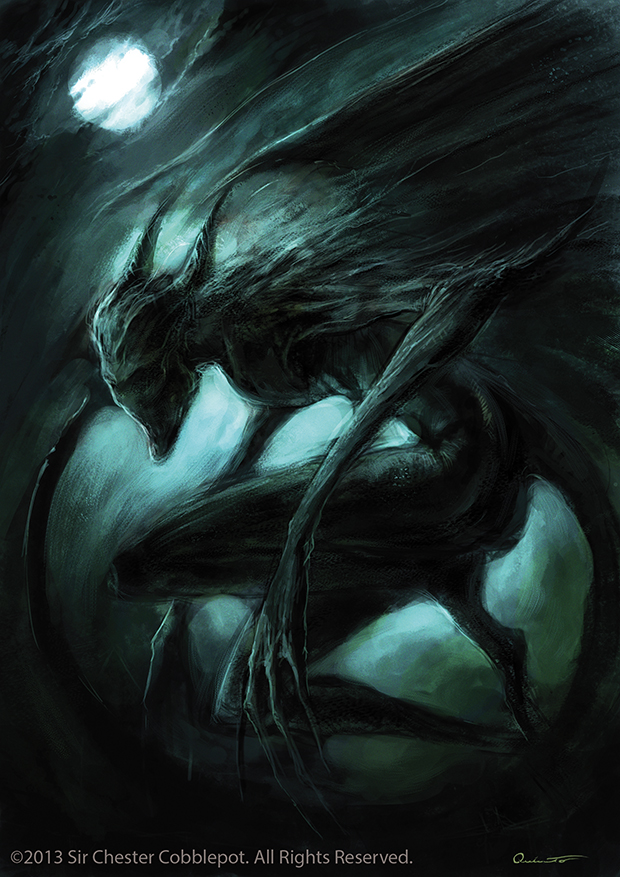The nightgaunts appeared in the poem Night-Gaunts as well as in the novella The Dream-Quest of Unknown Kadath, both by Lovecraft. Lovecraft apparently wrote once that when he was 6 or 7, he was tormented by a nightmare in which night-gaunts would snatch him up and carry him off.
Picture by Maichol Quinto.
Nightgaunt
Medium monstrosity, neutral evil
Armor Class
14 (natural armor)
Hit Points 78
(12d8+24)
Speed 30
ft., fly 50 ft.
Str Dex Con Int Wis Cha
19 (+4) 15 (+2) 15 (+2) 6
(-2) 14 (+2) 10 (+0)
Skills Perception +4, Stealth +6
Damage Resistances cold, psychic
Condition Immunities blinded, frightened, paralyzed
Senses blindsight 120 ft. (blind beyond
this radius), passive Perception 14
Languages understands Deep Speak but can’t
speak
Challenge 3
Camouflage. When in dim light or darkness, the
nightgaunt has advantage on Dexterity (Stealth) checks.
Faceless. The nightgaunt doesn’t have a face,
nor does it need to breathe. As a result, the nightgaunt is immune to gaze
attacks as well as any attacks that require inhalation, such as Stench.
Magic Resistance. The nightgaunt has advantage on
saving throws against spells and other magical effects.
Tickle. When the nightgaunt has successfully
grappled a creature, as a bonus action it can tickle the creature with its
barbed tail. Every round, a tickled creature must make a DC 14 Constitution
save or be stunned for 1 round. The nightgaunt may continue to attempt to
tickle the creature for as long as it is grappled. The nightgaunt may move its
full speed when grappling a stunned creature.
Actions
Clawed Hands. Melee weapon attack: +6 to hit, reach
5 ft., one target. Hit: 1 piercing damage, and the target is grappled (escape
DC 14). Until this grapple ends, the nightgaunt can’t use its clawed hands on
another target.
The
nightgaunt (or night-gaunt) is a strange and mysterious species of wholly unnatural
origin. Thought by scholars to have been summoned from another plane long ago,
their motivations are unknown. Nightgaunts are more or less humanoid in shape, very
thin and with slick, black skin. They have a pair of clawed hands and a long
barbed tail that they use to “tickle” victims into submission. Perhaps their
most unsettling feature is their complete lack of a face, while a pair of
inward-facing horns adorn their head. They fly using a pair of membranous
wings, and are incredibly silent.
Oddly, they
are extremely reluctant to fly over large bodies of water.
Night Time Predators
Nightgaunts
only come out at night. They avoid exposure to the sun, though as far as can be
determined, they aren’t harmed by its rays. When they spot prey, they silently swoop down upon it, grappling it and then using their barbed tails to “tickle”
it into submission. This is by no means a pleasant experience; rather, it is a
disorienting and humiliating experience that can leave prey helpless.
Once
subdued, the nightgaunt carries its victim to someplace typically dangerous. If
it needs to, it can drop the prey while in flight, but it prefers to set the victim
down safely and leave it to the tender mercies of whatever creatures may be
near-by. Some think that nightgaunts, having no mouths, feed on the psychic
energy produced by their victim’s fear and anguish rather than the victim’s
physical flesh. It has been observed that once it has set down a victim, a
nightgaunt will frequently stay close so as to observe what happens next.
Silent Sentinels
Nightgaunts
are frequently encountered guarding something. How one entices these creatures
to stand guard is a secret known to only a few. If they aren’t guarding
something on someone’s behalf, then they are guarding their own territory
against invaders. They can be very territorial and will defend their domain aggressively,
groups of the creatures flocking together to challenge invaders.

No comments:
Post a Comment